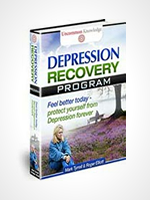Treating Depression: What Treatment Actually Works?
SO FAR in the Learning Path, we have looked at a lot of background on what clinical depression is, how it works, and what the facts are as far as research goes. Now you will see what this knowledge leads us to know about depression treatment.
- What are the drug treatments for depression and just how effective are they?
- How effective are alternative approaches, such as therapy, at treating depression?
How to best treat depression?
Recent depression research shows that how we perceive our depression, what we actually think it is, is actually important in the efficacy (efficiency) of the treatment we undergo (1) (2). What this means is that knowing all the facts about depression, really understanding depression, is incredibly important.
So if you have completed the Depression Learning Path this far, you will be well placed to make the most of whatever treatment you choose.
Research into treating depression
So much research has been done on depression, the right information is out there. However with so many vested interests, as well as different fields of study, it's hard to get a clear picture of what is actually the most effective way overall to beat depression for good.
Much of what you read here is based on a massive meta-study controlled by the US government, incorporated the findings of over 100,000 individual pieces of research. The research was carried out over a fifteen year period. (3)
The research compared the use of depression medication against various types of therapy. It also looked at how effective each treatment was at preventing further episodes of depression.
By comparing this volume of depression research on a "like for like" basis, we get a pretty clear picture of the most effective way of treating depression.
Treating depression with drugs
It's possible that, like millions of others, you may be taking drugs (antidepressants) of some kind to treat depression. Antidepressants are often the first treatment option prescribed by health professionals.
By understanding that antidepressants actually treat what is a common symptom of depression, rather then the condition itself, we can begin to understand some key facts about antidepressants, namely:
- Why antidepressants are only effective in around one third of cases, and partially effective in another third. The other third of cases get no benefit at all.
- Why the rate of relapse is so high when depression is treated with antidepressants alone?
- For many people, the side effects are more unpleasant than the depression itself, so they discontinue treatment.
We'll also consider why, if these drugs are as good at beating depression as we are told, is depression on the increase, and sufferers treated solely with antidepressants have an 80% chance of having a second episode of major depression?
If depression is making you feel really bad, the relief that antidepressants can sometimes bring can be very welcome. However, if you want to have the best chance of avoiding a relapse further down the line, it is essential you get the right kind of therapy, or skills training. We'll look at this later in the Depression Learning Path.
The cart before the horse
One of the main reasons given for depression being described as an illness (and therefore to be treated with drugs) seems, at the least paradoxical, if not misleading.
It is reasoned by some that the high rate of relapse after drug treatment indicates that depression should be treated as a chronic disease, i.e. treatment by long term, high dosage medication.
This is the explanation used, rather than the fact that drugs do not treat depression, merely the symptoms.
Yet, if we consider:
- The average length of depression, if left untreated is 8 months.
- Depression medication, typically, has to be taken for 6 weeks before it is known if it is effective or not, and then continued for 6 months.
- Citing relapse as a reason, some treatments recommend a "3 phase approach' which can last well over 2 years.
- Other treatments, such as a combination of cognitive, behavioural and interpersonal therapy, have a much lower rate of relapse. (We recommend that relaxation techniques are also used, to calm the emotions and allow a faster, more effective participation in therapy. It is also essential that the patient's lifestyle is checked to ensure that their basic emotional needs are being met.)
- Also, we should take into account the side effects of drug treatments, which we will come to soon.
Then it is clear that:
The ever-growing use of antidepressants as the primary weapon against depression, is highly questionable, particularly as a long-term solution.
The 'chemical imbalance' treated by antidepressants is almost always a result of depression, not a cause.
Antidepressant medication can be useful for some people in lifting severe depression symptoms quickly, but should not be the sole treatment for depression.
Without appropriate skills training, therapy, or whatever you want to call it, there is no reason why the depression shouldn't come back when a similar life situation arises again.
Treating depression with psychotherapy or counseling
All psychotherapies are not the same, and some can worsen depression, rather than improve it.
When discussing using the treatment of depression with psychotherapy, it is important to make some distinction in the types of treatment. While some have been shown to have high success rates, others are shown to be less effective than actually leaving the depression untreated.
How does therapy actually work?
Therapy for depression works in many ways - emotional support, problem solving, examining and changing thinking styles, checking basic needs are met, looking at behavior, teaching social and other skills and so on...
However, a good way to think about it is to look at the Cycle of Depression. Good therapy or counseling will break the cycle as quickly as possible, in as many places as possible and give you skills to ensure it stays that way.
In fact, the quickest way to lift depression is to cut down the amount of negative rumination, or introspection the depressed person is doing.
Next article: Depression Medication / Drugs - how it works
- Effects of a chemical imbalance causal explanation on individuals' perceptions of their depressive symptoms - Joshua J. Kemp, James J. Lickel and Brett J. Deacona, Behaviour Research and Therapy, Volume 56, May 2014.
- Do patients׳ illness beliefs predict depression measures at six months in primary care; a longitudinal study - Jeanette Lynch, Michael Moore, Rona Moss-Morris and Tony Kendrick, Journal of Affective Disorders, Volume 174, March 15 2014.
- Psychotherapy Versus Medication for Depression: Challenging the Conventional Wisdom With Data - David O. Antonuccio and William G. Danton, University of Nevada School of Medicine and Reno Veterans Affairs Medical Center Garland Y. DeNelsky, Cleveland Clinic Foundation. This huge meta-study of over 100,000 pieces of depression research recommends that the first-line treatment for depression should be appropriate psychotherapy, even when the depression is severe.







